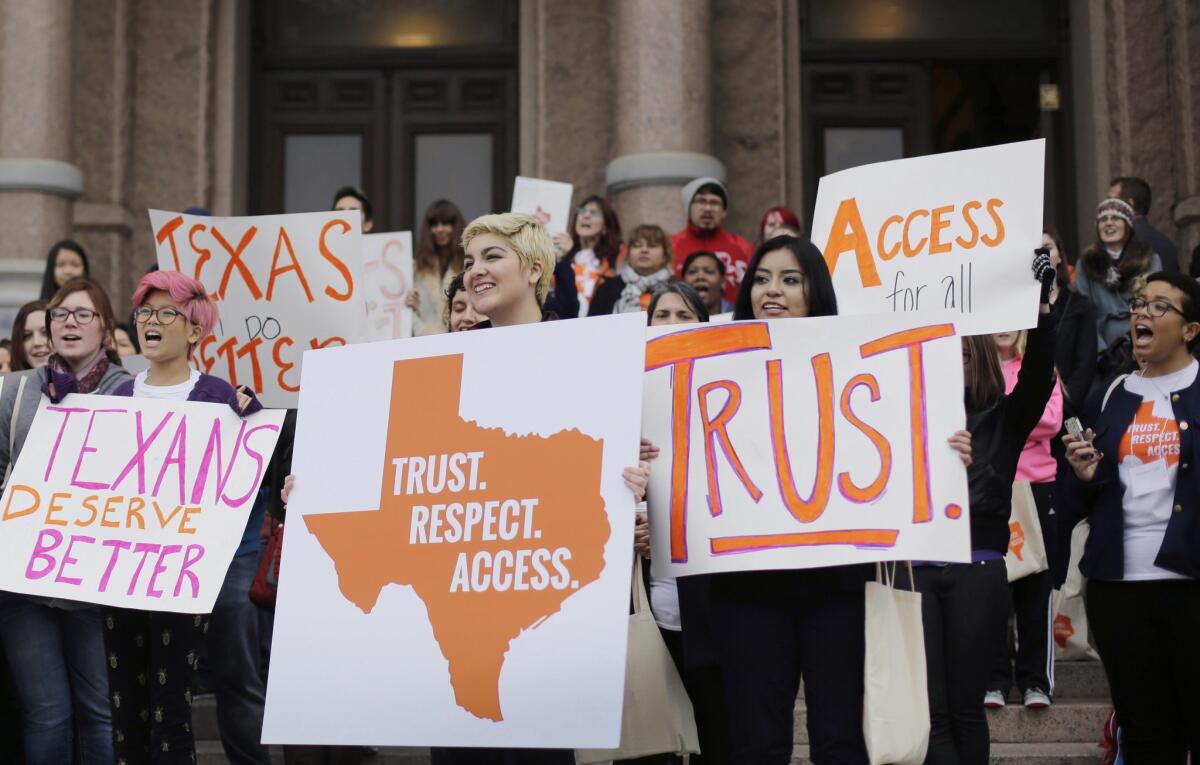Supreme Court to decide on abortion laws: Can a state regulate clinics out of business?

Abortion rights activists rally on the steps of the Texas Capitol in Austin last week.
Reporting from Washington — In a vast region of Texas that is “larger than California,” the Supreme Court was recently told, no doctors or health clinics would be licensed to perform abortions if the state is allowed to enforce stringent new medical regulations.
So, are these regulations a valid means to “increase the health and safety” of abortion patients, as the state maintains, or an unconstitutional scheme to deprive millions of Texas women access to legal abortion?
NEWSLETTER: Get the day’s top headlines from Times Editor Davan Maharaj >>
That is the question before the Supreme Court on Wednesday in a case that may be reshaped by the death of Justice Antonin Scalia.
Scalia was the court’s fiercest critic of the Roe vs. Wade ruling that established a right to abortion. He would have been a strong voice in favor of giving states more leeway to limit the procedure. Without him, however, it is highly doubtful the Texas case will yield a broad conservative ruling that gives states a green light to adopt ever-stricter restrictions on abortion.
The outcome still turns on Justice Anthony M. Kennedy, who has been both a steady critic of abortion and a key defender of the principle that women have a right to decide for themselves whether to end an early pregnancy.
In June, Kennedy joined with the court’s four liberals to bar Texas from fully enforcing the law while the justices considered an appeal from abortion-rights advocates. But in the court’s last abortion ruling, Kennedy wrote the 5-4 opinion in 2007 that upheld a federal ban on so-called partial-birth abortions.
The two key regulations at issue now require doctors who perform abortions to have “admitting privileges” at a local hospital and to work in clinics that meet the standards of an outpatient surgical center.
Prior to 2013, Texas carefully regulated and inspected abortion providers. Doctors needed transfer agreements with hospitals if a medical emergency arose, and clinics that performed abortions after 16 weeks of a pregnancy had to meet the standards of a surgical center.
The new state law, HB 2, extended both regulations so that, for example, a woman seeking an early abortion using medication must go to a surgical center to take the pills.
And for women in western Texas who seek an abortion, that could mean driving 300 miles to a clinic in Ft. Worth or Dallas, said Amy Hagstrom Miller, the president of Whole Woman’s Health who led the suit challenging the law.
“We had a call from a working mother of three from the Lubbock area. And she asked, ‘How can I make a 600-mile trip with three kids?’” Miller said.
And because the law includes mandatory waiting periods, the woman would have to spend several days in Ft. Worth. “This is not about safety,” Miller said.
Leading medical experts, including the American Medical Assn., the America College of Obstetricians and Gynecologists and the American Academy of Family Physicians, strongly urged the court to reject the Texas regulations as unneeded and potentially harmful.
Early abortions “are one of the safest medical procedures performed in the United States,” they told the court. “Neither requirement [in the Texas law] is supported by accepted medical practice or scientific evidence.”
No woman died in Texas from an abortion in the four years prior to the state adopting its new law, they said. Abortion-rights advocates, citing similar data, said a “woman in Texas is currently 100 times more likely to die from carrying a pregnancy to term than from having an abortion in a licensed abortion facility.”
They say many abortion providers in communities outside the major cities cannot afford the multimillion-dollar cost of expanding their facilities to meet the standards of an outpatient surgical center.
Texas had 40 abortion providers several years ago, but expects to have 10 or fewer, all in the major metro areas, if the new law is fully enforced.
For their part, Texas state lawyers say the justices should defer to the state Legislature.
Texas Solicitor General Scott Keller said lawmakers’ aim was to “ensure patient safety and raise standards of care.” Those challenging the law “have nothing close to the clearest proof needed to show that the legislature’s stated purpose is a sham,” wrote Keller, who served as a law clerk for Kennedy six years ago.
He said Texas legislators were motivated to act after Dr. Kermit Gosnell was tried and convicted of criminal negligence and murder in Philadelphia for botched abortions in 2011.
If Kennedy votes with the three conservative justices to uphold the Texas law, the court would likely be split 4-4 and unable to issue an opinion.
If so, the court may issue a one-line order that affirms on a tie vote the ruling of the U.S. 5th Circuit Court of Appeals, which upheld the Texas law. Such a move does not set a legal precedent, but it would allow Texas to enforce its law.
Twitter: @DavidGSavage
ALSO
Supreme Court agrees to hear biggest abortion case in two decades
Op-Ed: Sandra Day O’Connor and the fate of abortion rights
Pope opens the door to contraception in averting harmful effects of Zika virus
More to Read
Sign up for Essential California
The most important California stories and recommendations in your inbox every morning.
You may occasionally receive promotional content from the Los Angeles Times.










